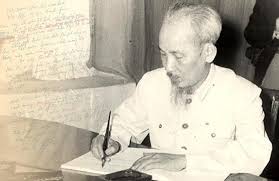
1. Eliminating the yoke of colonial rule and achieving national independence - the essence of the colonial national question.
From his youth, before embarking on his journey to save the country, Nguyen Tat Thanh (Ho Chi Minh) witnessed the conflict between the Vietnamese people and the French colonial invaders through the patriotic movements of his ancestors, and he soon formed the ambition to save the nation. In the 1920s, Nguyen Ai Quoc realized that the more severe the oppression and exploitation of imperialism against colonial peoples, the more fierce the reaction of the oppressed nation. Not only the working masses (workers and peasants), but also the upper classes and strata in society (petty bourgeoisie, bourgeoisie, and landlords) had to endure the humiliation of a people who had lost their country, of a nation that had lost its independence and freedom. Even the Vietnamese bourgeoisie differed from the Western bourgeoisie; although still an exploiting class, it was not the ruling class. They were not the target of revolution, but on the contrary, could become a force for the national liberation revolution.[1].
As the empire entered its imperialist phase, Western capitalist powers vigorously waged wars of colonial conquest, establishing colonial rule with brutal policies.
Before Western capitalism launched its cannons at the gates of Eastern nations, these countries were still heavily shrouded in the darkness of a declining feudal system, with a social structure consisting of two classes: feudal landlords and peasants. Under the impact of colonial exploitation programs, these classes in Vietnam underwent some degree of transformation, and new classes emerged: workers, the bourgeoisie, and the petty bourgeoisie. All of these classes were under the yoke of colonial capitalism.
Was the revolution in the colonies a national struggle or a class struggle? What was the "essence" of the revolution in the colonies? In the international communist and workers' movement, there was an argument that "the essence of the colonial national question is the peasant question," and since peasants are linked to land, the emphasis should be on the agrarian revolution and the class struggle in the colonies. Ho Chi Minh, however, saw it differently. He recognized that the most urgent and primary requirement of colonial society was to wage a struggle for national independence, not a class struggle as in Western capitalist societies. The target of the colonial revolution was colonialism, not capitalism or imperialism in general. Although actively involved in the French Communist Party and the Communist International, Nguyen Ai Quoc's views differed in many respects from those of the Central Committee of the French Communist Party and the Communist International, including on the national question in the colonies.
In July 1923, Nguyen Ai Quoc wrote a letter to the Central Committee of the French Communist Party, criticizing the Communist Parties in capitalist countries for their lack of interest in the colonial revolutionary movement, and criticizing the press.L'Humanitéitem removedForum of the ColoniesAnd the party's press reported very slowly on the colonial countries. On April 11, 1924, in a letter to the Executive Committee of the Communist International, he remarked: "The French colonies in general and Indochina in particular are little known among the proletariat and communists. The Communist International and the French Communist Party are very little informed about what is happening in those colonies." Therefore, "if we want to act effectively on the colonial issue, it is absolutely necessary to..."establish contact with those colonies"
On June 23, 1924, speaking at the 8th session of the 5th Congress of the Communist International, Nguyen Ai Quoc said: “I have come here to constantly draw the attention of the Communist International to the fact that colonies still exist, and to point out to the Communist International that revolution, in addition to the issue of the future of the colonies, also involves the dangers of the colonies. However, I see that it seems that you comrades have not fully grasped the idea that the fate of the world proletariat, and especially the fate of the proletariat in the colonial aggressor countries, is closely linked to the fate of the oppressed class in the colonies. Therefore, I will take advantage of every opportunity to raise these issues and, if necessary, I will awaken you comrades to the colonial question.” “The venom and vitality of the poisonous snake of capitalism are concentrated in the colonies.” “In discussing the possibilities and means of carrying out revolution, and formulating plans for the upcoming struggle, the British and French comrades, as well as comrades in other parties, have completely ignored this extremely important strategic point. Therefore, I strongly urge you comrades: pay attention!” On July 1, 1924, at the 22nd session of the Fifth Congress of the Communist International, he criticized the Communist Parties in France, England, the Netherlands, Belgium, and the Communist Parties in colonial countries for not implementing a truly proactive policy on the colonial issue, while the bourgeoisie in those countries had done everything to keep the peoples they enslaved under oppression. See:[2].
According to Ho Chi Minh, the essence of the national question in colonies is the struggle against colonialism and the pursuit of national independence.
In many works such asColonial mentality, Equality, The abyss of colonialism, The murderous civilizing mission...Ho Chi Minh focused on denouncing colonialism, exposing its so-called "civilizing" ideology. He wrote: "To cover up the evils of its exploitative and murderous regime, colonial capitalism always adorns its rotten medal with idealistic mottos: Fraternity, Equality, etc." "If the Linsch-style executions of Black people by those cowardly Americans are inhumane, then I no longer know what to call the mass killings of African people by Europeans in the name of civilization."[3]In articles with titlesIndochinaIn many other articles, he strongly condemned the harsh rule and brutal exploitation of French colonialism in Indochina in the political, economic, cultural, and educational spheres. He clearly pointed out that the antagonism between oppressed nations and colonial imperialism was the main contradiction in the colonies, an irreconcilable contradiction. The heavier the oppression and domination of a nation, the more fierce, diverse, and varied the national reaction would be. Studying the situation in Indochina, Ho Chi Minh observed: "Behind the passive submission, the people of Indochina hide something seething, something roaring, and something that will explode terribly when the opportunity arises."[4]In the workThe Condemnation of the French Colonial RegimeNguyen Ai Quoc strongly condemned the crimes of colonialism, which stripped away all human rights and national rights in the colonies.
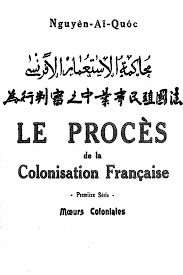
WorkThe Condemnation of the French Colonial Regime
While Karl Marx discussed the struggle against capitalism and V.I. Lenin extensively addressed the struggle against imperialism, Ho Chi Minh focused on the struggle against colonialism. Marx and V.I. Lenin discussed class struggle in capitalist countries, while Ho Chi Minh focused on the struggle for national liberation in colonies. In many of his works, especially his...Revolutionary pathHe distinguished three types of revolution: proletarian revolution, bourgeois revolution, and national liberation revolution, and defined the nature and tasks of colonial revolution as national liberation.
To liberate the nation, it is necessary to determine a path of national development, because the direction of national development dictates the immediate requirements and content of the struggle for independence. Drawing from the practical experience of our ancestors' national salvation movements and the history of mankind, Ho Chi Minh affirmed that the direction of development for the Vietnamese nation in the context of the new era is socialism. Planning the path of development from a national liberation revolution to a socialist revolution is a completely new issue. The transition from a colonial country to socialism must go through many different strategic stages.first political programIn his writings for the Communist Party of Vietnam, Ho Chi Minh stated: "To carry out the bourgeois democratic revolution and the agrarian revolution to move towards a communist society." "Moving towards a communist society" is the long-term direction of development. "The bourgeois democratic revolution" is the strategic stage of national liberation, completing the task of fighting imperialism and achieving national independence (without fully carrying out the agrarian revolution). "The agrarian revolution" is not part of the bourgeois democratic revolution, but is a strategic stage with the main task being the agrarian revolution. "Moving towards a communist society" is the next stage of development to gradually achieve the ultimate goal.[5].
Each strategic phase has a central strategic mission, and within each phase, a portion of the mission of the next phase can be accomplished in advance, or the mission of the previous phase can be completed.
Ho Chi Minh's planning of the national development path was dialectical and objective, not conflating the two tasks of fighting imperialism and feudalism into a single bourgeois democratic revolution. It was consistent with the specific historical circumstances in the colonies. This is also a unique feature, differentiating it from the path to capitalism in Western countries.
The core of the colonial national question is independence and freedom. Independence and freedom are the greatest aspirations of colonial peoples. Ho Chi Minh said: "Freedom for my people, independence for my homeland, that is all I want; that is all I understand."[6].
In early 1930, Nguyen Ai Quoc drafted it.first political programThe Party's program for national liberation was correct and creative, its core ideology being independence and freedom.
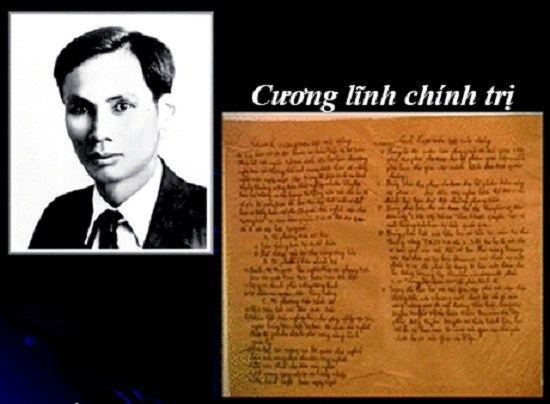
The first political program
In May 1941, Ho Chi Minh chaired the Eighth Conference of the Central Executive Committee of the Party and wrote a letter.Greetings to our fellow citizens, clearly stating: "At this moment, the interests of national liberation are paramount."[7]The person who directed the establishment.Vietnam Independence Alliance, published in a newspaperVietnam is independent.In August 1945, Ho Chi Minh summarized the Vietnamese people's will to fight for independence and freedom in the immortal words: "No matter how great the sacrifice, even if we have to burn down the entire Truong Son mountain range, we must resolutely win independence!"
Following the success of the August Revolution, he, on behalf of the Provisional Government, read...Declaration of Independence, solemnly declaring before the whole world:
"The Vietnamese nation has the right to freedom and independence, and in fact has become a free and independent nation. The entire Vietnamese people are determined to dedicate all their spirit and strength, lives and property, to upholding that right to freedom and independence."[8].
In letters and telegrams sent to the United Nations and governments of various countries in the period following the August Revolution, Ho Chi Minh solemnly declared: "Our people sincerely desire peace. But our people are also determined to fight to the end to protect our most sacred rights: territorial integrity for the Fatherland and independence for the country."[9].
The nationwide resistance war against French colonialism broke out. Demonstrating his determination to protect national independence and sovereignty, Ho Chi Minh issued a resounding call: "No! We would rather sacrifice everything than lose our country, than be enslaved!"[10].
As the American empire frantically expanded the war, massively pouring expeditionary troops and modern war equipment into the South, while simultaneously waging a war of destruction against the North on an increasingly fierce scale and intensity, Ho Chi Minh upheld the greatest truth of the era:Nothing is more precious than independence and freedom."[11].
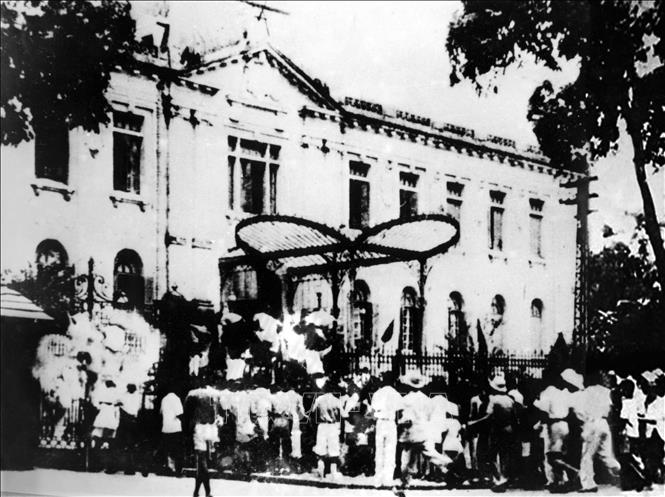
Ho Chi Minh clearly saw the strength of Vietnamese nationalism. It was the strength to fight and win against any foreign invaders: “Our people have a fervent love for their country. That is a precious tradition of ours. From ancient times to the present, whenever the Fatherland has been invaded, that spirit has surged, forming an incredibly powerful and immense wave, sweeping away all dangers and difficulties, and submerging all traitors and invaders.”[12].
According to Ho Chi Minh, "It is precisely because of patriotism that our army and people have endured countless hardships for many years, resolutely fighting to crush the colonial invaders and the Vietnamese traitors, resolutely building an independent, unified, democratic, free, prosperous, and strong Vietnam, a new democratic Vietnam." In Ho Chi Minh's thought, genuine nationalism is a part of the international spirit, "completely different from the 'patriotic' spirit of the reactionary imperialists."[13].
With unwavering faith in the patriotic traditions of the Vietnamese people, he affirmed: "The enemy may occupy the sky, the enemy may occupy the land, but they can never occupy the fervent patriotism of our people."
Independence and freedom were the goals of the struggle, the source of strength that led to the victory of the Vietnamese nation in the 20th century, a great ideology in the era of national liberation. "Nothing is more precious than independence and freedom" was the slogan of action for the Vietnamese people and also a source of inspiration for oppressed nations around the world fighting against colonialism. Therefore, Ho Chi Minh was not only...National liberation heroHe was not only a Vietnamese national but also "the initiator of the liberation struggle of colonial peoples in the 20th century".
2. The right to national self-determination – a creative aspect of Ho Chi Minh's thought on the national question.
At the end of the 20th century, when nationalist states such as the Union of Soviet Socialist Republics, the Czechoslovak Socialist Republic, and the Union of Yugoslav Socialist Republics collapsed, we saw even more clearly the scientific and practical value of Ho Chi Minh's approach to resolving the national question in Indochina.
Ho Chi Minh deeply valued human rights, but always emphasized national rights. He studied and embraced the human rights principles mentioned in...Declaration of Independence1776 of America,Declaration of Human Rights and Civil Rights1791 of the French Revolution[14]These include the right to equality, the right to life, the right to liberty, and the right to the pursuit of happiness. He affirmed, "These are undeniable truths." But it didn't stop there. From human rights, Ho Chi Minh generalized and elevated them to national rights: "All nations in the world are born equal; every nation has the right to life, the right to happiness, and the right to freedom."[15].
In 1919, applying the principle of national self-determination solemnly recognized by the victorious Allies in World War I, on behalf of patriotic Vietnamese people, Nguyen Ai Quoc sent to the Versailles Conference an eight-point petition demanding freedom and democracy for the Vietnamese people. The petition did not address the issue of independence or autonomy, but focused on two basic points:
First,They demanded equal legal rights for the indigenous people of Indochina as for Europeans. Specifically, they called for the abolition of special courts used as tools of terror and repression against the most honest segment of the population (i.e., patriots); and the abolition of the authoritarian system of decree-based rule, replacing it with a system of laws.
Second, demanding minimum democratic freedoms for the people, namely freedom of speech, press, freedom of association, assembly, and residence...
That petition was not accepted by the imperialist countries. Nguyen Ai Quoc concluded: to liberate the nation, one cannot passively wait for external help, but must first rely on the strength of one's own people.
As a true internationalist, Ho Chi Minh fought not only for the independence of the Vietnamese nation, but also for the independence of all oppressed peoples.
In 1914, when World War I had just broken out, he donated all the money he had saved from his meager salary to the British resistance fund and told his friend: "We must fight for the freedom and independence of other nations as we fight for our own."[16]Those who saw one of the important meanings of the Russian October Revolution (1917) was that it set a shining example of the liberation of oppressed nations, which "opened before their eyes."the era of anti-imperialist revolution, the era of national liberation"[17]In 1921, he participated in the founding.Colonial UnionThe aim was to unite the people of colonial countries in a common front against imperialism and to build a fighting solidarity between colonial peoples and the French people. The manifesto of the Society, drafted by Nguyen Ai Quoc, clearly stated the purpose of gathering all colonial people residing in France to denounce the crimes of colonialism before public opinion and to raise awareness among the colonial people to rise up and liberate themselves.
Upholding the spirit of independence and self-reliance, and implementing the principle of national self-determination, Ho Chi Minh did not forget his international obligations in supporting national liberation struggles around the world. He enthusiastically supported the Chinese people's resistance against Japan, the Laotian and Cambodian people's resistance against French colonialism and American imperialism, and advocated that the victories of each country's revolution should contribute to the common victory of the world revolution.
In Indochina, in particular, Ho Chi Minh recognized and addressed the national question with a spirit of independence, self-reliance, and creativity, creating a solid foundation for consolidating and strengthening the solidarity and fighting alliance among the three nations—a strategic factor ensuring the victory of the revolution in each country.
According to Ho Chi Minh's perspective, Indochina was invaded and dominated by colonialism, and the liberation struggles of each nation were closely intertwined and inseparable. However, he did not view Indochina as a federation, but rather saw it as comprising three distinct nations. He distinguished between two types of issues: 1- Developing the strength of each nation in the struggle against colonialism and achieving national unity; 2- On the basis of respecting the right to national self-determination and the independence and freedom of each nation, achieving unity among the three nations and helping each other against a common enemy.
Nguyen Ai Quoc presided over the Eighth Conference of the Central Executive Committee of the Indochinese Communist Party (May 1941), advocating for resolving the national question within the framework of each country in Indochina, aiming to awaken the national spirit in each nation. The conference emphasized that the peoples of the Indochinese peninsula all suffered under the domination of French and Japanese imperialism, therefore it was necessary to "concentrate revolutionary forces throughout Indochina," making Vietnam, Laos, and Cambodia united, relying on each other, and supporting each other to achieve victory. However, discussing the national question at this time meant discussing the freedom and independence of each nation. Therefore, the Party had to respect and correctly implement the policy of "national self-determination" for the peoples of Indochina. After expelling the French and Japanese, "the peoples of Indochina will, according to their will, organize into a democratic republican federation or establish their own independent nation." "The freedom and independence of the peoples will be recognized and valued."[18].
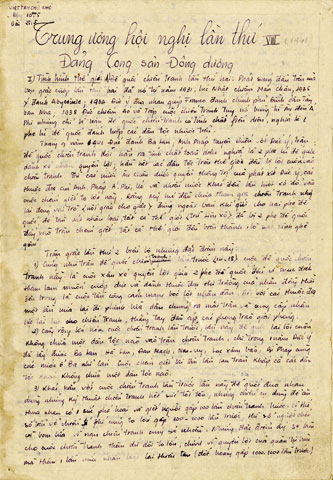
Resolution of the Eighth Central Committee Meeting of the Indochinese Communist Party, May 1941
The conference decided to establish a separate front in each country: the Vietnam Independence League, the Laos Independence League, and the Cambodia Independence League. Based on the formation of fronts in each country, a common front of the three countries would be established. The Party and the Viet Minh “must do everything possible to help the Cambodian and Lao peoples organize the Cambodia Independence League and the Laos Independence League, so that later they can establish the Indochina Independence League.”[19].
Resolving the national question within each country in Indochina was a correct and innovative policy, aimed at realizing the right to national self-determination, unleashing the strength of each nation in the struggle for self-liberation; shattering the enemy's distorted arguments about the national question, about the so-called "Indochinese Federation" and the "communist threat"; and at the same time creating conditions for the unity of the three nations against a common enemy, laying the foundation for building a new policy and establishing a new relationship between Vietnam and its two neighboring countries sharing a common aggressor.
After World War II, the French colonialists returned to invade. The people of the three Indochinese countries had to continue to rise up in resistance. Assisting the Laotian revolution, as well as the Cambodian revolution, was a consistent policy of Ho Chi Minh, considering "helping a friend is helping oneself," respecting each other's independence and sovereignty, and not helping a friend do things for them, but strengthening them so that they could do things themselves.
In his Appeal to the United Nations (December 1946), Ho Chi Minh affirmed: "Regarding Laos and Cambodia, Vietnam respects the independence of those two countries and desires cooperation on the basis of absolute equality between sovereign states."[20].
In July 1947, in response to a foreign journalist, Ho Chi Minh clearly stated: "Our foreign policy is to be friendly with all our neighbors... Cambodia, Laos, etc., and to have no animosity towards any country."[21]The viewpoint of Ho Chi Minh and the Indochinese Communist Party was:
1 - Do not prioritize Vietnam's interests when dealing with Laos and Cambodia.
2 - Firmly uphold the principle of national self-determination; Laos and Cambodia must make their own decisions.
3. Do not apply Vietnam's policies, principles, and guidelines to Laos and Cambodia like installing machinery.
4 - Need help from Laos and Cambodia so you can do it yourself.[22].
For Ho Chi Minh, "helping a friend is helping oneself." Help your friend to become stronger; they must do it themselves. In his thinking, there was no question of establishing an Indochinese federation.
While the Indochinese Communist Party was still operating clandestinely and lacked the conditions to establish a separate party in each country, it was responsible for leading and coordinating the resistance of the three nations. However, according to Ho Chi Minh, each communist party, belonging to a nation, must first fulfill its historical mission to its own nation. In early 1930, Ho Chi Minh named the Party the Communist Party of Vietnam. After a period of time, it had to change its name to the Indochinese Communist Party and lead the Indochinese revolution. In 1951, together with the Central Committee of the Party, he advocated separating the Lao and Cambodian party branches to establish a revolutionary party in each country, aiming to formulate a political line suitable to the circumstances of each nation; at the same time, it also defined the responsibility of the Vietnam Labor Party and the Vietnamese people to support the struggle for national independence of Laos and Cambodia.
In September 1952, the Indochinese Tri-Country Alliance Conference met to discuss the implementation of the Front's specific action program. At the conference, Ho Chi Minh said:The Vietnamese people wholeheartedly and sincerely helped the people of Laos and Cambodia unconditionally..
In early April 1953, the Central Committee of the Party, the Government, and President Ho Chi Minh, together with the Laotian resistance government and the Itxala Front, decided to launch the Upper Laos campaign. President Ho Chi Minh instructed the Vietnamese troops:Helping the people of a neighboring country is helping ourselves.”[23]We must uphold the spirit of internationalism, respect the sovereignty and customs of other countries, and cherish the people of those countries.
In the early years following the signing of the 1954 Geneva Accords on Indochina, based on a correct understanding of the actual situation in Laos and Cambodia, recognizing the role of these two countries in protecting security in Indochina in particular and Southeast Asia in general, and prioritizing the interests of the three nations, on January 1, 1955, President Ho Chi Minh declared: The Democratic Republic of Vietnam is ready to establish friendly relations with the Kingdom of Laos and the Kingdom of Cambodia. This was an important signal, laying the foundation for building solidarity and an alliance appropriate to the new historical conditions.
In March 1965, in Phnom Penh,Indochina People's ConferenceThe conference was convened at the initiative of Crown Prince Norodom Sihanouk, Head of State of the Kingdom of Cambodia. President Ho Chi Minh sent a congratulatory telegram to the conference, affirming that the struggle of the people of Vietnam, Laos, and Cambodia, united closely, would certainly achieve final victory.
3. National independence is linked with national unity - a unique feature in Ho Chi Minh's thought on the national question.
National independence and national unity are a fundamental law of existence and development for the Vietnamese nation, and the path to survival for the Vietnamese people. This is a major viewpoint of Ho Chi Minh. He said: "Vietnam is one country, the Vietnamese people are one nation. Rivers may dry up, mountains may erode, but this truth will never change."
In 1887, based on the annexation and imposition of national rule, implementing a divide-and-conquer policy, the French colonialists established the so-called "French Indochina Federation," comprising five territories (Tonkin, Annam, Cochinchina, Laos, and Cambodia) headed by a French Governor-General.
Ho Chi Minh condemned the French colonialists for dividing Vietnam, "establishing three different regimes in the Central, Southern, and Northern regions to prevent the unification of our country, to prevent our people from uniting."[24]The struggle against colonialism and for the independence of the Vietnamese nation was also a struggle for national unity and territorial integrity. Ho Chi Minh clearly stated that the purpose of the August Revolution was to "reclaim"peace, unity, independence, and democracy"For our Fatherland, for our people." The purpose of the resistance war against French colonialism was to preserve and develop the victories of the August Revolution, that ispeace, unity, independence, and democracy"
The independence and unity of the Fatherland were the aspirations and fighting will of Ho Chi Minh and the entire Vietnamese nation. He accepted and signed the preliminary agreement on March 6, 1946, even though he had not yet demanded that the French colonialists recognize Vietnam's independence, but they had to acknowledge "Vietnam as a nation."a country"Freedom" would have its own government, parliament, army, and finances. The implementation of national reunification would be decided by referendum.
Before going to France, duringLetter to the people of Southern Vietnam(June 1946), Ho Chi Minh affirmed:
"The people of Southern Vietnam are citizens of Vietnam."
Rivers may dry up, mountains may wear away, but that truth will never change![25].
The purpose of his trip was "to resolve the issue of Vietnam's independence and unify the North, Central, and South." On June 25, 1946, while meeting with journalists, photographers, and filmmakers in Paris, he clearly stated, "The Vietnamese people demand unity and independence."[26].
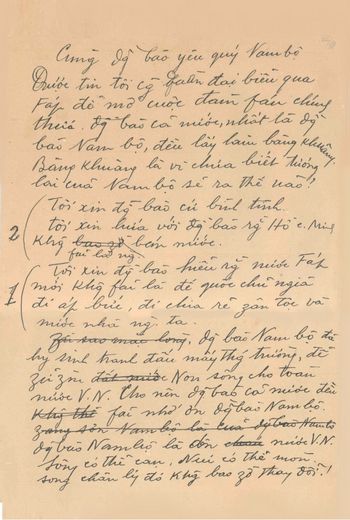
Letter from President Ho Chi Minh to the people of Southern Vietnam before his trip to France for negotiations, 1946
On July 12, 1946, at a press conference, when asked, "If Southern Vietnam refuses to be annexed to Vietnam, what will the President do?", he said: "Southern Vietnam shares the same ancestors as us, so why wouldn't Southern Vietnam want to be part of Vietnam? The Basques and Bretons don't speak French, yet they are still French. The people of Southern Vietnam speak Vietnamese, so why would they even think about hindering the unification of Vietnam?"[27]He declared to reporters: "Southern Vietnam is a part of Vietnam; no one has the right to divide it, and no force can divide it."[28].
In his speech at the National Day celebration of the Democratic Republic of Vietnam, organized by the Union of Overseas Vietnamese and the Franco-Vietnamese Friendship Association in Paris (September 2, 1946), Ho Chi Minh clearly stated: “The most fervent wish of all the Vietnamese people is that our reborn homeland will never be divided and nothing can divide it,” “...division and fragmentation cannot bring prosperity. It is absurd to attempt to rely on a weak, divided, and fragmented Vietnam to achieve the strength of the French Union.”[29].
On September 22, 1946, aboard the warship Dumont d'Éhville, in a letter replying to Mrs. Sossy of the French Women's Union, Ho Chi Minh wrote: “You love your country, you long for your country to be independent and unified. If anyone tries to infringe upon that independence and unity, I am certain that you will fight to the end to defend it. We do the same. We love our Vietnamese Fatherland, and we also want our Fatherland to be independent and unified.” He affirmed, “We are determined to use all our strength to win our national independence and territorial integrity.”[30].
Upon returning from France, he declared to the nation: due to the current circumstances in France, the issues of Vietnam's independence and reunification could not yet be resolved. "But sooner or later, I dare say that Vietnam will certainly be independent, and North, Central, and South will certainly be reunified."[31]"Central, Southern, and Northern Vietnam are all part of the same country. We all share a common ancestry and lineage; we are all blood brothers and sisters. A country with a Central, Southern, and Northern region is like a family with three brothers. Just as France has regions like Normandy, Provence, and Bosco."
"No one can separate a family, no one can separate France, and no one can separate Vietnam."[32].
The speaker said: “As long as the country remains ununified and our compatriots continue to suffer, I cannot eat or sleep peacefully. I solemnly promise my compatriots that: With the determination of our people, with the determination of the entire nation, the South will certainly return to the loving embrace of our homeland.”[33].
At the October 31, 1946 session of the Second Session of the First National Assembly, after being entrusted by the National Assembly with the responsibility of forming a new government, Ho Chi Minh declared the government's purpose to be "to build the nation internally and to strive for national independence and unity externally."[34].
In his Appeal to the United Nations (December 1946), he clearly outlined France's actions in "creating the Republic of Cochinchina with a puppet government" and affirmed that the Vietnamese people "are determined to fight to the end to defend their most sacred rights: territorial integrity for the Fatherland and independence for the country."[35].
Unable to resolve the Franco-Vietnamese conflict through peace negotiations, Ho Chi Minh stated...National Call to Armswith the aim of achieving complete independence and unification.Letter to the people of Vietnam, the people of France, and the people of the Allied nations.He affirmed: “The resistance war is very long and arduous. No matter how many sacrifices we have to make and no matter how long the resistance lasts, we will definitely fight to the end, until Vietnam is completely independent and unified.”[36].
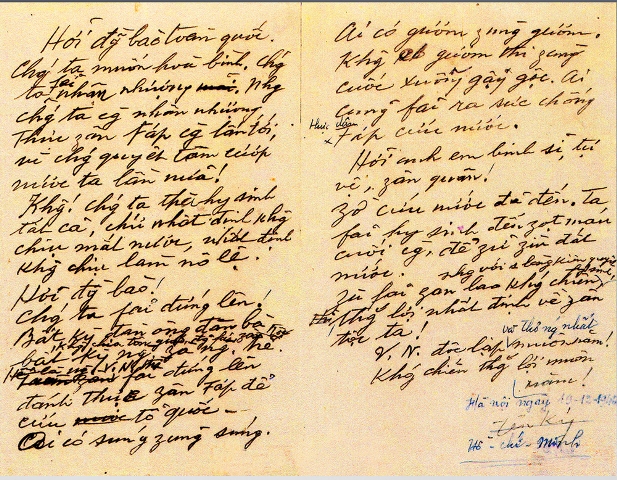
National Call to Arms
With the signing and implementation of the 1954 Geneva Agreement on Indochina, Vietnam was temporarily divided into two regions. Ho Chi Minh defined the goal of the Vietnamese people after the signing of the 1954 Geneva Agreement on Indochina as also fighting to maintain peace.to achieve national unity, complete independence and democracy throughout the country.”[37].
On July 22, 1954, he analyzed that the regional adjustment was temporary, a transitional step to implement a ceasefire, restore peace, and move towards national reunification through general elections. He stated that the regional adjustment "is absolutely not about dividing our country, absolutely not about secession." He affirmed: "Central, Southern, and Northern territories are all our land; our country will certainly be unified, and all our compatriots will certainly be liberated." He pointed out: "The struggle to consolidate peace, achieve reunification, and complete independence and democracy is also a long and arduous struggle." He added: "We must strive to implement free general elections throughout the country."unifiedhome country[38].
The goals that the Vietnamese people strive for were affirmed by Ho Chi Minh in many speeches, writings, and interviews with domestic and foreign newspapers... On the occasion of the 9th National Day celebration (1954), he clearly stated: "Our common task now is:Properly implementing the ceasefire agreement, fighting to preserve and consolidate peace, achieving national reunification, and completing independence and democracy throughout the country.The call was made: “All compatriots from South to North must fight and prepare for the revolution.”free general election, in order to performnational unity”[39].
Faced with the new plot of the American imperialists and their lackeys, Ho Chi Minh affirmed: "Vietnam will certainly be unified, because our country is one entity, no one can divide it." He advocated consolidating the North in order to...Providing practical assistance to our compatriots in the South who are fighting for peace and reunification.”[40].
To unite all forces for the struggle for national reunification, Ho Chi Minh advocated expanding and strengthening the National United Front: "From South to North, whoever supports peace, unity, independence, and democracy, we are ready to unite with them, sincerely cooperate with them, regardless of which faction they have belonged to in the past."[41].
On September 2, 1955, in an article for a newspaper.For lasting peace, for a people's democracy.Ho Chi Minh clearly stated: “The Government of the Democratic Republic of Vietnam has set for itself the first objective of thoroughly and fully implementing the Geneva Agreement, which means immediately convening a consultative conference between the South and the North, as the first step towards preparing for a free general election to unify the country.”[42].
According to Ho Chi Minh, "The most important task of our people, National Assembly and Government is to strive to build socialism in the North, fight for the peaceful reunification of the country and contribute to the protection of peace in Southeast Asia and the world."[43]Speaking at the opening of the Eighth Session of the First National Assembly, Ho Chi Minh stated: “The immediate task of our entire people is to strive to build and consolidate the North, gradually advance the North towards socialism, and at the same time fight for national reunification, in order to build a peaceful, unified, independent, democratic, and prosperous Vietnam.” “The struggle for national reunification through peaceful means on the basis of independence and democracy is a long, difficult, and complex revolution.”[44].
At the Third Party Congress (September 1960), Ho Chi Minh affirmed: "Our nation is one, Vietnam is one country. Our people will certainly overcome all difficulties and achieve national reunification, with North and South becoming one family."[45].
On August 8, 1963, in response to a question from journalist W. Burchett: "Could the President please confirm whether the armed resistance in the South was supported by the North?", Ho Chi Minh said: "In all aspects—geography, history, culture, and ethnicity—the Vietnamese people are one. We have united in one heart against French colonialism and Japanese aggression. This is something that the provisional demarcation line drawn along the 17th parallel, intended to facilitate the signing of the 1954 ceasefire agreement, cannot change. The unity of Vietnam and the Vietnamese people has been recognized and enshrined in the Geneva Accords. Therefore, the struggle of our compatriots in the South is supported and endorsed by the entire Vietnamese people, both north and south of the 17th parallel."
From 1965 onwards, the US imperialists increasingly intensified their war of aggression against Vietnam with a strategy of "limited war" in the South and a war of destruction in the North. This was evident in numerous interviews with international journalists, such as the French female reporter Daniel Huynebel (May 7, 1964), orWorkers' Daily(English) (July 1, 1965), Ho Chi Minh always affirmed: "Vietnam is one country. The Vietnamese people are one nation," the US imperialists are the ones who divided Vietnam, and the Vietnamese people will fight to the end for independence and national unity.[46].

President Ho Chi Minh read the appeal to the people and soldiers throughout the country to resolutely defeat the invading American enemy.
Before his departure, he clearly stated: "No matter how difficult and arduous the struggle, our people will achieve complete victory. The American imperialists must certainly leave our country. Our homeland will certainly be unified. The people of the North and South will certainly be reunited in one family."[47]In his will of May 1965, he wrote: “My last wish is: that the entire Party and all the people of Vietnam unite and strive to build a peaceful, unified, independent, democratic, and prosperous Vietnam, and make a worthy contribution to the world revolutionary cause.” In the supplementary draft of May 1968, he instructed that “Prepare everything for the reunification of the Fatherland.The user used red ink to write the phrase "unification of the Fatherland"This emphasizes a crucial task that must be undertaken immediately after the victory in the resistance war against the US."
Ho Chi Minh's thought on the national question was formed and developed in conjunction with the national liberation movements, including the Vietnamese national struggle, aimed at abolishing colonial rule, achieving national independence and reunification, forming an independent national state, and continuing to develop according to the choices of each nation, reflecting the greatest truth of the era: "Nothing is more precious than independence and freedom." For the Vietnamese nation specifically, this development followed a socialist direction, aiming to fulfill Ho Chi Minh's ultimate wish: "to build a peaceful, unified, independent, democratic, and prosperous Vietnam, and to make a worthy contribution to the world revolutionary cause."[48]That ideology is profoundly scientific and revolutionary, not following any dogmatic model. This is also Ho Chi Minh's great contribution to the theoretical treasury of Marxism-Leninism on the national question.
*Faculty of Social Sciences and Humanities, Vietnam National University, Hanoi.
[1]InParty's Brief Political ProgramNguyen Ai Quoc wrote, "Native capitalists have no power; we shouldn't tell them to side with the imperialists." See Ho Chi Minh:Complete Collection, National Political Publishing House, Hanoi 2000, p. 1.
[2]Ho Chi Minh Institute:Ho Chi Minh – A Biographical Chronicle, Vol. 1, National Political Publishing House, Hanoi, 2006, pp. 238-279.
[3]Ho Chi MinhComplete Collection, National Political Publishing House, Hanoi, 2000, Vol. 1, pp. 75 and 321.
[4]Ho Chi Minh,Complete Collection, Ibid., Vol. 1, p. 28.
[5]Some opinions suggest thatfirst political programThe Party's initial assessment of the Vietnamese revolution's development in two stages requires further study. Later, the Second Party Congress defined three strategic stages: 1- Completing national liberation, 2- Developing people's democracy, 3- Advancing towards socialism. See moreThesis on the Vietnamese Revolutionof Truong Chinh andPolitical Platform of the Vietnam Workers' Party, Communist Party of Vietnam: Complete Party Documents, National Political Publishing House, Hanoi, Vol. 12, p. 435.
[6]Tran Dan Tien:Stories about the life and activities of President Ho Chi Minh, National Political Publishing House, Hanoi, 1994, p. 44.
[7]Ho Chi Minh City:Complete Collection, Ibid., Vol. 3, p. 198.
[8]Ho Chi Minh City:Complete Collection, Ibid., Vol. 4, p. 4.
[9]Ho Chi Minh City:Complete works,Ibid., Vol. 4, p. 469.
[10]Ho Chi Minh City:Complete Collection, Ibid., Vol. 4, p. 480.
[11]Ho Chi Minh City:Complete Collection, Ibid., Vol. 12, p. 108.
[12]Ho Chi Minh,Complete Collection, Ibid., Vol. 6, p. 171.
[13]Ho Chi Minh,Complete Collection, Ibid., Vol. 6, p. 172.
[14]Some argue that Ho Chi Minh absorbed the ideology of national independence fromDeclaration of Independenceof America and democratic ideology inDeclaration of Human Rights and Civil RightsThe French Revolution needs further study.
[15]Ho Chi Minh City:Complete Collection, Ibid., Vol. 1, p. 555.
[16]Ho Chi Minh,Complete Collection, Ibid., Vol. 9, p. 173.
[17]Ho Chi Minh,Complete Collection, Ibid., Vol. 8, p. 563.
[18]Communist Party of Vietnam:Complete Collection of Party Documents, Vol. 7, National Political Publishing House, Hanoi, 2000, p. 113
[19]Communist Party of Vietnam:Complete Collection of Party Documents, Vol. 7, op. cit., p. 122.
[20]Ho Chi Minh City:Complete Collection, Ibid., Vol. 4, p. 470.
[21]Ho Chi Minh City:Complete Collection, Ibid., Vol. 5, p. 169.
[22]The War Review Committee was under the direct authority of the Politburo.Summary of the resistance war against French colonialism - Victories and lessons learned, National Political Publishing House, Hanoi, 1996, p. 389.
[23]Ho Chi Minh City:Complete Collection, Ibid., Vol. 7, p. 64.
[24]Ho Chi Minh City:Complete Collection, Ibid., Vol. 4, pp. 1-2.
[25]Ho Chi Minh City:Complete Collection, Ibid., Vol. 4, p. 246.
[26]Ho Chi Minh City:Complete Collection, Ibid., Vol. 4, p. 345.
[27]Ho Chi Minh City:Complete Collection, Ibid., Vol. 4, p. 272.
[28]Ho Chi Minh City:Complete Collection, Ibid., Vol. 4, p. 369.
[29]Ho Chi Minh City:Complete Collection, Ibid., Vol. 4, pp. 283-284.
[30]Ho Chi Minh City:Complete Collection, Ibid., Vol. 4, pp. 302-303.
[31]Ho Chi Minh City:Complete Collection, Ibid., Vol. 4, p. 417.
[32]Ho Chi Minh City:Complete Collection, Ibid., Vol. 4, pp. 418-419.
[33]Ho Chi Minh City:Complete Collection, Ibid., Vol. 4, p. 419.
[34]Ho Chi Minh City:Complete Collection, Ibid., Vol. 4, p. 427.
[35]Ho Chi Minh City:Complete Collection, Ibid., Vol. 4, p. 469.
[36]Ho Chi Minh City:Complete Collection, Ibid., Vol. 4, p. 484.
[37]Ho Chi Minh City:TotalVolume 7, pp. 337-339.
[38]Ho Chi Minh City:Complete Collection, Ibid., Vol. 7, pp. 322-323.
[39]Ho Chi Minh City:Complete Collection, Ibid., Vol. 7, p. 339.
[40]Ho Chi Minh City:Complete Collection, Ibid., Vol. 8, pp. 47-48.
[41]Ho Chi Minh City:Complete Collection, Ibid., Vol. 8, p. 49.
[42]Ho Chi Minh City:Complete Collection, Ibid., Vol. 8, p. 57.
[43]Ho Chi Minh City:Complete Collection, Ibid., Vol. 10, p. 174.
[44]Ho Chi Minh City:Complete Collection, Ibid., Vol. 9, pp. 156-157.
[45]Ho Chi Minh City:Complete Collection, Ibid., Vol. 10, p. 199.
[46]Ho Chi Minh City:Complete Collection, Ibid., Vol. 11, p. 458.
[47]Ho Chi Minh City:Complete Collection, Ibid., Vol. 12, p. 499.
[48]Ho Chi Minh City:Complete Collection, Ibid., Vol. 12, p. 500.
Author:Assoc. Prof. Dr. Vu Quang Hien